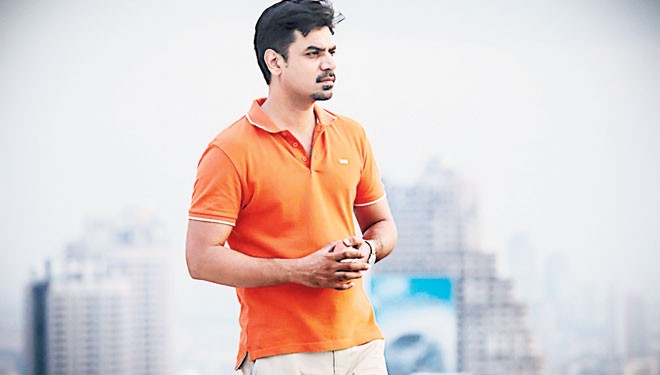
Actor/Scriptwriter Vasay Chaudhry on why Pakistani films shouldn’t be accused of taking inspiration from across the border

From the campy desi James Bond in Jutt and Bond to the malevolent and abusive Sikander in Jackson Heights, Vasay Chaudhry has created some of the most interesting characters to have appeared on our television screens in recent times. He’s also stepped into the shoes of several popular characters, including the UK-return ‘Bobby D’ from the uber popular GEO TV series Dolly-Taaka-Annie Ki AyegiBaraat. Chaudhry transitioned from TV to cinema just as naturally and his upcoming venture, the comedy Jawani Phir Nahin Aani, will see him try his luck at the box office for the second time around, following the reasonable success of 2013’s Main Hoon Shahid Afridi.
As with the cricket-themed MHSA, Chaudhry gets scriptwriting credits for Jawani Phir Nahin Aani. What’s special this time around is that he also gets to make his big screen acting debut. Don’t, however, expect him to be the one walking away with the best one-liners just because he’s in control of the script.
"About 15 years ago, when Teen Bata Teen was one of the most popular shows on television, and viewers would get to write in to talk shows with their opinions about their favourite shows, I once heard a letter that said AdeelHashmi always had the funniest lines in the show because he was the writer. That really struck me and when I took up writing professionally, I vowed I would never hear that about myself," recalls Chaudhry laughingly.
With a large ensemble cast that includes everyone from Hamza Ali Abbasi, HumayunSaeed and Javed Sheikh to Ahmed Ali Butt, Bushra Ansari, Sarwat Gillani, Ayesha Khan and Mehwish Hayat, it wasn’t an easy task doling out the punch lines between so many talented actors and making sure everyone got their fair share. Still, Chaudhry maintains that the film will be worth seeing for its unabashed, mainstream, crowd-pleasing humour.
And contrary to what that now infamous one-second shot of bikini-clad women in the promo might have you thinking, it’s supposedly a family entertainer. "One of the toughest calls for me a writer was to make sure that we didn’t cross the line between funny and vulgar or cheap. I had a very strict personal censor on and we’ve tried to keep it as safe as possible. But also realistic. If we are showing goris at a beach, they won’t be wearing chooridars," he says bluntly.
As a movie that centres on a trip taken by three close friends, the project has drawn the inevitable comparisons to similar movies from across the border, particular ZoyaAkhtar’s Zindagi Na MilegiDobara. The oft-repeated criticism that local cinema is too inspired by Bollywood leaves Chaudhry, an avid follower of sub-continental cinema, quite irked. "Pakistani cinema began in 1947 and song and dance was as much a part of it as it was of films made across the border. Bol and Khuda KayLiye are not representative of local cinema. Watch Filmazia for a week and you will find out what local cinema is about. Nur Jehan, Mehdi Hassan, our very own chocolate hero Waheed Murad - these are the people that gave Lollywood its identity - commercial and mainstream."
Chaudhry would know. His family owned Ratan cinema, one of the oldest theatres in Lahore, and growing up he had the rare advantage of being able to watch local films, a pastime other kids his age in those times would have probably balked at. For the hip kids at LCAS, then the coolest college of its time where Chaudhry did his A-levels from, he provided a ticket to the intriguing, and often forbidden, world of Lahore’s inner city and the local cinema scene. "I remember taking a bunch of us from college, including Khadija Shah and Bilal Lashari, to LaksmiChowk to watch Shaan’s Mujhay Chaand Chahiye and for a lot of them, it was their first Pakistani film ever."
A childhood spent watching local movies inculcated in him a love for Punjabi culture and colloquialisms that he used to his benefit in his television hits such as Jutt and Bond and Dolly Ki Ayegi Baraat. But despite penning some of TV’s most enjoyable shows, he maintains that writing is a dreary job. "It’s very depressing sitting in a room by yourself and trying to give a voice to so many different characters. I call television writing ‘pop writing’ - you have to constantly give hit after hit. The pressure can be immense."
It’s this unrelenting pressure to keep performing that has let the television industry down, says Chaudhry. "I don’t think the industry can continue to progress until writers start getting royalties. If Khalil-ur-Rehman Qamar knows that one hit play will keep on generating revenue for him through royalties, he won’t be compelled to take on five other projects that might not be as good. Creative people can’t keep churning out product. With everyone from the writers to the actors involved in as many projects as they can get their hands on, quality is being comprised for quantity."
Luckily, the opposite is true for the film industry at the moment and that is where his interests currently lie. "There are 6 to 7 films being released this year, all made by people who we always wished would make films, people like Jami and Asim Raza. The fate of these films will decide the fate of cinema."
As for detractors who say that the industry suffers from an identity crisis and copies Bollywood too much, Chaudhry wraps up a cinema history lesson for them in a manner that would do one of his loud Punjabi characters justice. "The two industries have always been similar. Pakistani movies had item songs even in the ‘70s and definitely in the ‘90s. It’s just that when Nargis did it under a waterfall it was called a ‘gandagaana’ and when Kareena or Katrina did it, it became the more respectable ‘item number’."